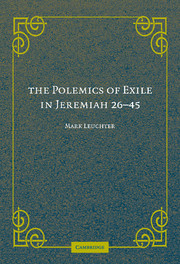Book contents
- Frontmatter
- Contents
- Acknowledgments
- List of Abbreviations
- Note on Citations
- Introduction
- 1 The Hermeneutics of Citation: Jeremiah 26
- 2 The Identification of Legitimate Israel: Jeremiah 27–32:15
- EXCURSUS 1 THE REDACTION OF JEREMIAH 1–25:13+OAN
- EXCURSUS 2 THE REENGAGEMENT OF THE ROYAL LINE IN JEREMIAH 33:14–26
- 3 The Standards of Faith and Intermediation: Jeremiah 34–36
- 4 The Fall of Judah, the Descent into Egypt, and Baruch ben Neriah: Jeremiah 37–45
- EXCURSUS 3 THE “WORDS OF JEREMIAH” AND SERAIAH'S COLOPHON IN THE MT AND LXX TRADITIONS
- 5 The Polemics of Exile
- 6 The Exilic Coalition between the Shaphanides and Levites
- Conclusion
- Notes
- Bibliography
- Author Index
- Scriptural and Extra-Biblical Texts Index
- Subject Index
EXCURSUS 1 - THE REDACTION OF JEREMIAH 1–25:13+OAN
Published online by Cambridge University Press: 27 July 2009
- Frontmatter
- Contents
- Acknowledgments
- List of Abbreviations
- Note on Citations
- Introduction
- 1 The Hermeneutics of Citation: Jeremiah 26
- 2 The Identification of Legitimate Israel: Jeremiah 27–32:15
- EXCURSUS 1 THE REDACTION OF JEREMIAH 1–25:13+OAN
- EXCURSUS 2 THE REENGAGEMENT OF THE ROYAL LINE IN JEREMIAH 33:14–26
- 3 The Standards of Faith and Intermediation: Jeremiah 34–36
- 4 The Fall of Judah, the Descent into Egypt, and Baruch ben Neriah: Jeremiah 37–45
- EXCURSUS 3 THE “WORDS OF JEREMIAH” AND SERAIAH'S COLOPHON IN THE MT AND LXX TRADITIONS
- 5 The Polemics of Exile
- 6 The Exilic Coalition between the Shaphanides and Levites
- Conclusion
- Notes
- Bibliography
- Author Index
- Scriptural and Extra-Biblical Texts Index
- Subject Index
Summary
jeremiah 30–31 were updated at a time when major units of Jeremianic literature were already circulating among the exiles of 597 BCE. The oracles make reference to the independent collection of chs. 27–29 (30:3 invokes 29:14) as well as important older passages currently found outside of that collection (31:27 refers to 1:10–12; 31:33 refers to 24:7). That the closing lines of chs. 30–31 make reference to passages from early in the prophet's career (1:10–12) and a relatively contemporaneous oracle (Jer 24:7) speaks to the likelihood that the prophet's “active corpus” circa 594/3 was comprised of oracles spanning Jeremiah 1–24, a conclusion supported by form-critical and rhetorical considerations as well. We may surmise that the redaction of chs. 30–31 was also connected to the event narrated in the colophon of Seraiah (Jer 51:59–64), which was affixed to an early form of the oracle against Babylon (Jeremiah 50–51) that Seraiah was commanded to read and throw into the Euphrates as a symbolic act. By the end of the first decade of the sixth century, Jeremiah 27–29/30–31/50–51 constituted a distinct collection directed to the favored 597 community, conveying teachings specifically geared for them but presenting them in rhetorical forms that supported those teachings. But this unique literary collection could not obviate the earlier collections of oracles that the prophet had composed, the force of which still applied to the corrupt Judeans living in the homeland who had yet to endure the inevitable wrath of yhwh.
- Type
- Chapter
- Information
- The Polemics of Exile in Jeremiah 26-45 , pp. 66 - 71Publisher: Cambridge University PressPrint publication year: 2007



